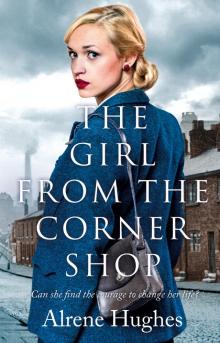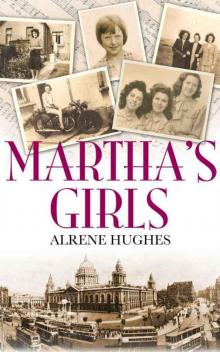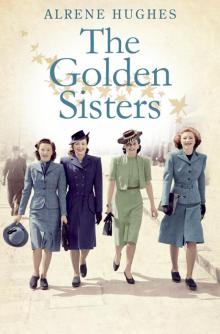- Home
- Alrene Hughes
The Girl from the Corner Shop
The Girl from the Corner Shop Read online
Also by Alrene Hughes
The Girl in the Pink Raincoat
THE GIRL FROM THE CORNER SHOP
Alrene Hughes
www.headofzeus.com
First published in the UK in 2019 by Head of Zeus Ltd
Copyright © Alrene Hughes, 2019
The moral right of Alrene Hughes to be identified as the author of this work has been asserted in accordance with the Copyright, Designs and Patents Act of 1988.
All rights reserved. No part of this publication may be reproduced, stored in a retrieval system, or transmitted in any form or by any means, electronic, mechanical, photocopying, recording, or otherwise, without the prior permission of both the copyright owner and the above publisher of this book.
This is a work of fiction. All characters, organizations, and events portrayed in this novel are either products of the author’s imagination or are used fictitiously.
A catalogue record for this book is available from the British Library.
ISBN (HB): 9781788543996
ISBN (E): 9781788543989
Cover design: Rory Kee
Images: woman © Richard Jenkins
Houses © steveblanc
Author photo: Tony Edwards
Head of Zeus Ltd
First Floor East
5–8 Hardwick Street
London EC1R 4RG
WWW.HEADOFZEUS.COM
Contents
Also by Alrene Hughes
Welcome Page
Copyright
Dedication
Chapter 1
Chapter 2
Chapter 3
Chapter 4
Chapter 5
Chapter 6
Chapter 7
Chapter 8
Chapter 9
Chapter 10
Chapter 11
Chapter 12
Chapter 13
Chapter 14
Chapter 15
Chapter 16
Chapter 17
Chapter 18
Chapter 19
Chapter 20
Chapter 21
Chapter 22
Chapter 23
Chapter 24
Chapter 25
Chapter 26
Chapter 27
Chapter 28
Chapter 29
Chapter 30
Chapter 31
Chapter 32
Chapter 33
Chapter 34
Chapter 35
Chapter 36
Chapter 37
Chapter 38
Chapter 39
Chapter 40
Acknowledgements
About the Author
An Invitation from the Publisher
For Heather
Chapter 1
Helen pulled back the curtains and looked out over the roofs and chimney pots etched against a rare cloudless sky over Manchester. Jim would be two hours into his shift at the fire station by now and, because there had been no air raids overnight, there was a good chance he would be home in time for his tea and they would have all of Sunday evening together. There was so much to talk about. On New Year’s Day they would be moving out of the corner shop and away from her mother into a home of their own. Then there was the five pounds Jim had won in the Christmas raffle at the working men’s club, enough to buy some second-hand furniture. But best of all, she wanted to carry on the conversation they had started last night about having a baby.
As she did every Sunday, she made her mother’s breakfast and took it up to her, then she set about cleaning the house and shop. And as she worked, she thought about her mother insisting that she would still have to work in the shop when she moved. She was desperate for a clean break, but Jim had told her that they needed to get a bit of money behind them and why didn’t she ask for an increase in her wages for agreeing to stay on? He didn’t understand that she had been under her mother’s thumb all her life and she would put up with any hardship to be free of her.
She had just finished donkey-stoning the step at the front of the shop when Mrs Lowe appeared at her side, clearly agitated. ‘Helen, can you help me out? I’ve nothin’ for the kids to eat today. Could you let me have a loaf and a pint of milk on tick? Albert only got three days’ work this week and I’ve tried to eke it out…’
‘Come inside, I’ll see what I can do.’ Helen put the loaf and milk on the counter then added a couple of eggs and a tin of soup. ‘That’ll see you through.’
‘You’re a life saver. I’ll pay you back next Sunday – when you’re on your own.’
‘That’ll be fine, Mrs Lowe.’
The woman gathered up her groceries and at the door she stopped. ‘When you move out, you’ll still be working in the shop, won’t you?’
‘I will for the time being.’
‘God help us if you go. I know she’s your mother, an’ all, but Elsie Slater wouldn’t give you the dirt under her fingernails, let alone tick to feed hungry kids.’
When she had gone, Helen recalled her mother’s words. ‘Cash on the nail. You get nowt for nowt.’ She had grown up with that refrain and seen poverty every day in the shop. It was the women she felt sorry for, trying to keep body and soul together, but beyond giving them a few groceries on tick, there was nothing she could do for them.
It was afternoon before her mother made an appearance. Helen was sitting by the fire working on Jim’s Christmas present, a cricket sweater. She had been knitting it since the summer and had only to finish the V neck but, with the double stripe and getting the tension right so it didn’t pucker, she had already undone it twice.
‘Have you not finished that yet?’ asked her mother. ‘You’ll be lucky if he has it by the start of the season the way you’re going. You’d have been better saving up and buying him one.’
‘I couldn’t afford it, they’re far too dear.’
‘I’ve told you before, you’re a married woman now and your husband should be giving you an allowance.’
Helen felt the anger rising inside her and this time she wasn’t going to bite her tongue. ‘No, Mam, it’s you who should be giving me a decent wage. You’ve been paying me ten shillings a week since I left school at fourteen and I’m twenty-two now!’
‘You’re forgetting board and lodgings, aren’t you?’
‘No, I’m not. You’ve been charging Jim for the two of us living here.’
‘I charge you the going rate, what’s wrong with that?’
Helen shook her head in frustration. ‘I’m telling you this, when I move out, I want you to pay me the same as any other woman working in a shop.’
‘Who do you think I am, Woolworth’s?’
‘If you don’t, I’ll just get another job. I’ve heard they want women in the factories to replace the men called up and the money’s very good.’
Her mother pretended to laugh. ‘You wouldn’t last two minutes in a factory. You’ve had it easy for too long.’
‘You know what, Mam, I think I’d like to go out to work. I’d get to meet different people and maybe learn to—’
‘Don’t be daft, you’re not cut out for factory work and you wouldn’t want to be mixing with the rough and ready types you’d meet there.’
‘What are you saying that for? They’re ordinary people like us.’
‘Ah, that’s where you’re wrong. We own a business and that puts us on a higher rung up the ladder. You’ll be a businesswoman too when I’m gone.’
‘There’s no talking to you, is there? You think you’re right about everything and I’m fed up with you treating me like a child. I’m a married woman, for goodness’ sake.’
‘Oh yes, I know that all right and I suppose it was your husband who put you up t
o asking for more money.’
Helen felt the tears prick her eyes. ‘No, he didn’t. I just want what’s fair, Mam, otherwise…’ Her voice wavered.
‘Otherwise, what?’
Helen jammed the knitting needles into the ball of wool and stood up to face her mother. ‘Otherwise, I won’t just be moving out at New Year, I’ll be leaving a job that pays me a pittance as well!’ and she fled the room, slamming the door behind her.
She wrapped up warm and left the house to walk off her anger. She hadn’t meant to say all those things, especially not about leaving her job at the shop. But that was the trouble with her mother, you couldn’t reason with her. Normally, Helen would just let her win, but she had no right to speak about Jim the way she did.
She turned the corner on to the main road just as a Salvation Army band outside the Co-op struck up ‘O, Come All Ye Faithful’, and the small crowd gathered around them began to sing along. Her steps slowed, she joined in and, in the time it took to sing a few carols, her anger had gone. She popped a thrupenny bit into the collection box and crossed the road to the croft opposite where a man was selling Christmas trees.
Her mother looked up from peeling vegetables when she came in and she rolled her eyes at the little tree, but said nothing. Helen didn’t care; this would be their first Christmas together as man and wife and she was determined to make the dreary living room behind the shop a bit festive. She put the little tree in a bucket of ash and fetched the decorations from the cellar for her and Jim to decorate it after their tea. Then she set about the cricket sweater again – with three days to go before Christmas, she was determined to finish it.
The table was set, the potatoes and vegetables were boiled and the brisket, small as it was, rested on the carving dish. The clock ticked on towards half past six; Jim would be on his bike by now. She wanted to see his face when he saw the tree, wanted to tell him how she’d stood up to her mother, wanted to share her excitement about starting a family…
The sound of the air-raid siren went from a low whine to an incessant scream in seconds – impossible to ignore. ‘For Heaven’s sake,’ said Helen. ‘That’s all we need.’
‘Never mind standing there complaining,’ her mother shouted. ‘Shape yourself and get the trays! We’ll have to eat in the cellar.’ There was plenty to carry down the steep stairs and they had to make several trips with the hot pots and pans. ‘For God’s sake, what’s the point of bombing people when they’re about to sit down to their tea,’ she complained. ‘Honestly, how long is it since we’ve seen a piece of brisket? Months, I’m sure, and now we have to eat it in the cellar in an air raid. It had better not be another false alarm.’
Helen was hard on her heels with the warm plates. ‘We’ve no gravy made,’ she said.
Her mother threw her hands in the air. ‘There you are, a good meal ruined.’
‘No, it isn’t,’ said Helen. ‘I’ll go and make some; there’ll be time before the siren stops and the bombs start dropping.’ She ran back upstairs calling over her shoulder, ‘Don’t forget to put Jim’s dinner on a plate. He’ll have it warmed-up when he gets home.’
Helen poured some of the juices from the meat into a pan, added water and gravy browning and stood stirring it over the gas thinking about Jim. He would normally be home around now, but she could guess what had happened. He’d have been on his bike on his way back home and at the first sound of the air-raid siren he would have turned around and raced back to the fire station to put in another shift. Only then did she remember Jim’s words the previous evening. ‘Liverpool’s burning and they’ve sent so many Manchester firemen and equipment to help.’ She hadn’t realised the implications. That grim look on his face was because he was worried that the Luftwaffe might turn their sights on Manchester and, with only half the brigade, the city would burn.
The siren wound down, the gravy came to the boil, and the world fell eerily silent.
Helen knew the duties of a fireman during a raid. Jim had made sure she understood how they dealt with the fires and bombs and the rescues. ‘It’s all about good training and knowing your limits,’ he had explained. ‘Don’t worry about me. It’s my job and I’m good at it.’ She had smiled at him then and told him she was proud of him, but nothing he had said stopped her being anxious every time he went on duty and terrified when there were raids.
They sat at the little card table in the cellar eating their tea in silence and, halfway through the meal, the anti-aircraft guns, just up the road in Boggart Hole Clough, exploded into action as the first wave of enemy planes droned overhead. Helen picked at her food and thought about the steady build-up of raids since October, mostly in the industrial areas, but there had been times when Jim’s crew, based in the city centre, were sent as reinforcements. She pushed her plate away and, not for the first time, she wished he had chosen a less dangerous way to earn a living.
‘Are you not going to finish that?’ Helen shook her head and her mother reached across the table and scraped what was left on Helen’s plate on to her own. ‘Can’t let good food go to waste.’
Later, they cleared the plates and sat at the table playing Rummy, gambling with matchsticks, listening to the sound of planes overhead and the pounding of the anti-aircraft guns. Helen pictured the incendiaries descending in their thousands, setting buildings alight across the city. They’d be landing and spitting like fireworks, before bursting into flames; harmless on roads but devastating on the roofs if they weren’t extinguished quickly. Some buildings had firewatchers who, with their stirrup pumps and buckets of sand, smothered the fires. Firemen with their hoses would be tackling the worst of them to stop them spreading, knowing that blazing buildings were a beacon for the next wave of bombers carrying the heavy explosives.
Only once did an explosion sound nearby and Helen shuddered as the reverberations came up through the cellar floor and passed through her body.
‘They’re after the aircraft factory,’ her mother remarked and picked up Helen’s discarded queen to win the hand.
Around ten o’clock there was a lull in the bombing. ‘I think I’ll go upstairs and have a look,’ said Helen. She kept her voice calm, but inside she was desperate to see any signs that the fires had taken hold in the city.
She came up out of the cellar and already she felt a rise in temperature. On the way up to her bedroom she became aware of a low sound like a wind getting up, but it wasn’t until she opened her bedroom door that she realised it was the distant roar of flames devouring the city. She caught her breath at the sight of the fiery sky and stood mesmerised. It’s all gone, she thought, and her blood ran cold at the thought of Jim in the middle of such an inferno. She glanced down at the street below and in the cast of orange light she could pick out the cobbles on the road and a child’s hopscotch chalked on the pavement below. Then her ear caught the distant droning sound, closer and closer it came. Overhead, the searchlights flashed and arced across the sky… searching, searching.
For a moment the house seemed to tremble then a deafening roar filled her ears and she let out a scream at the sight of the huge black shapes rushing over, one after the other, flying so low that she could see the markings on their fuselages.
She shouldn’t have left the cellar. Jim would be furious when he found out that she had been watching the bombing, but she was rooted to the spot. She pictured him in his uniform organising his crew, doing everything to reduce the risks to keep them safe while they tried to save whatever they could. His words came back to her again: ‘You have to respect the fire, read the fire, and always remember that life comes before property.’ God, how she hoped his words would protect him and his men. She jumped at the noise of a heavy explosion so close that it almost stopped her heart, and debris flew across the street, smashing windows and filling the air with the smell of burning and cordite. She turned and ran.
‘It’s terrible out there. The whole city’s going up in flames,’ she shouted as she came down the cellar steps. ‘Jim’ll be in the
middle of it all. I know he will!’
‘Helen, get a grip. He’s doing his job, standing on a street with a hose in his hand; it’s not as if he’s fighting hand to hand in the desert, like Mrs Connor’s boy.’
On and on throughout the night the waves of bombers pounded the city and Helen lay on her camp bed in the cellar, listening to it all and praying for Jim. If anyone could come through such a night it was him. It was past five in the morning before she fell asleep exhausted and, at half past six, a full twelve hours since the raid began, the all-clear finally sounded.
It should have been dark at that time, but when they came out of the cellar and opened the blackout curtains, the yard was lit by an unnatural ochre-coloured dawn.
‘I don’t know about you, but I’m going to bed,’ said her mother. ‘I hardly slept with all that racket going on.’
Helen knew she wouldn’t be able to sleep with the fires still raging, so she got washed and dressed and opened up the shop just as the milkman arrived on his horse and cart. ‘Bad in the city centre, I’ve heard. Good job I get my milk from Oldham. One crate as usual, love?’ She nodded, not trusting herself to speak, so worried was she about Jim. Where was he? How long would it be before he came off duty?
The bread man brought news that Piccadilly was ablaze. ‘Whole area is cordoned off. It’s desperate. They say it’s spreading.’ She knew then where he would be, right in the heart of his patch alongside his men, and she was certain he wouldn’t come home until the embers had turned to ash. Throughout the morning the customers came and went. Some brought news of the devastation: the Victoria Hotel on Deansgate razed to the ground; the cathedral, still standing but damaged; the town hall and the Midland Hotel unscathed.
Her mother eventually reappeared through the chenille curtain into the shop about eleven o’clock. ‘I’m glad you’re here,’ said Helen, taking off her overall. ‘I want to go into town to take Jim something to eat.’
‘But what about the shop? You know it gets busy coming up to dinnertime.’

 The Girl from the Corner Shop
The Girl from the Corner Shop Martha's Girls
Martha's Girls A Song in my Heart
A Song in my Heart Golden Sisters
Golden Sisters